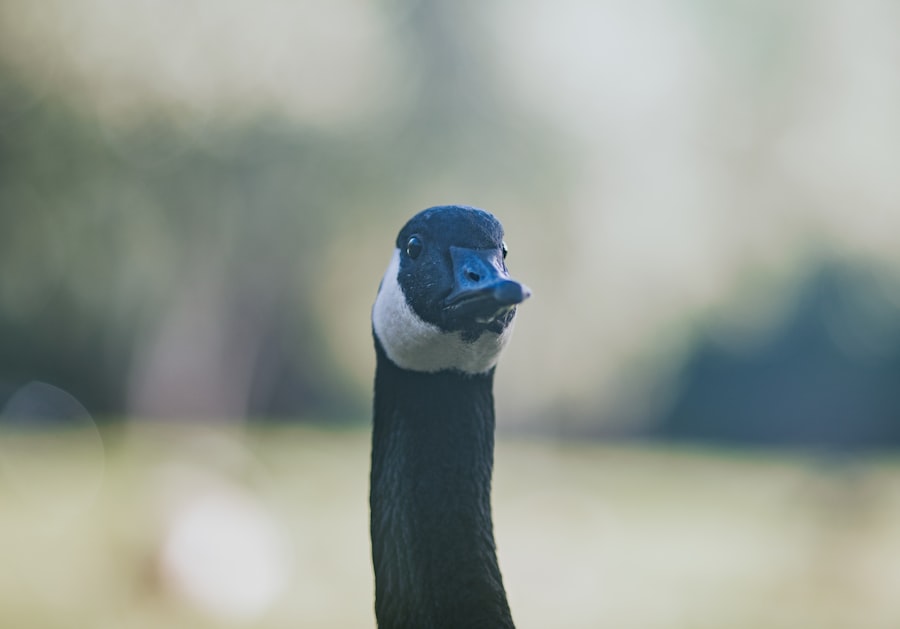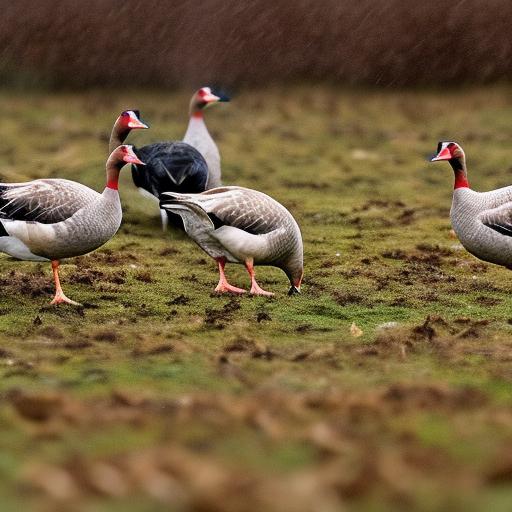Keeping geese for meat production in the UK is a growing trend among small-scale farmers and homesteaders. Geese are known for their flavorful and succulent meat, making them a popular choice for those looking to raise their own meat. In addition to the delicious taste, there are several other reasons why raising geese for meat is a good idea.
Personally, I have been raising geese for meat for several years now and have found it to be a rewarding and profitable venture. Not only do I get to enjoy the satisfaction of knowing where my food comes from, but I also have the opportunity to provide high-quality, ethically-raised meat to my local community.
Key Takeaways
- Keeping geese for meat is a viable option for small-scale farmers in the UK.
- Choosing the right breed of geese is crucial for successful meat production.
- Feeding and nutrition should be carefully managed to ensure healthy and flavorful meat.
- Adequate housing and shelter are necessary for the well-being of geese raised for meat.
- Regular health checks and disease management are essential for a successful operation.
Choosing the Right Breed of Geese for Meat Production
When it comes to choosing the right breed of geese for meat production in the UK, there are several popular options to consider. Some of the most common breeds include Embden, Toulouse, and Pilgrim geese. These breeds are known for their large size and excellent meat quality.
When selecting a breed for meat production, there are several characteristics to look for. First and foremost, you want a breed that grows quickly and efficiently converts feed into meat. Look for breeds that have a good feed-to-meat conversion ratio and reach market weight within a reasonable timeframe.
Based on my personal experience, I would recommend the Embden breed for those looking to raise geese for meat. They are known for their large size and excellent meat quality. Additionally, they are relatively easy to care for and have a calm temperament, making them suitable for small-scale production.
Feeding and Nutrition for Geese Raised for Meat
Feeding and nutrition play a crucial role in the growth and development of geese raised for meat production. It is important to provide a balanced diet that meets their nutritional requirements at each stage of growth.
Geese have specific nutritional requirements that need to be met in order for them to grow and develop properly. A diet high in protein is essential for muscle development, while carbohydrates provide the energy needed for growth. It is also important to provide a source of vitamins and minerals to support overall health.
When it comes to feeding meat-producing geese, it is recommended to provide a balanced commercial feed specifically formulated for geese. This feed should contain the necessary nutrients in the correct proportions. Additionally, supplementing their diet with fresh greens and access to pasture can help provide additional nutrients and promote healthy growth.
Housing and Shelter Requirements for Geese Raised for Meat
Providing appropriate housing and shelter is essential for the health and well-being of geese raised for meat production. Geese require a safe and comfortable environment that protects them from the elements and predators.
There are several housing options to consider when raising geese for meat. Traditional options include simple shelters or sheds with access to an outdoor area. It is important to provide enough space for the geese to move around comfortably and access to fresh water at all times.
When it comes to space requirements, it is recommended to provide at least 10 square feet of indoor space per goose. Outdoor space should be provided as well, allowing the geese to graze and exercise.
In order to keep geese safe and comfortable, it is important to provide adequate ventilation in their housing. This helps prevent respiratory issues and keeps the air fresh. Additionally, regular cleaning of the housing is necessary to maintain good hygiene and prevent disease.
Health and Disease Management for Meat-Producing Geese
Maintaining good health in geese raised for meat production is crucial for their overall well-being and productivity. There are several common health issues that can affect geese, but with proper management, they can be prevented or minimized.
Some common health issues in geese include respiratory infections, parasites, and foot problems. To prevent respiratory infections, it is important to provide good ventilation in their housing and avoid overcrowding. Regular deworming and parasite control measures should also be implemented to prevent infestations.
Vaccinations are an important part of disease management in geese. It is recommended to vaccinate against common diseases such as avian influenza and Newcastle disease. Consult with a veterinarian to determine the appropriate vaccination schedule for your geese.
Maintaining good hygiene and cleanliness in their housing is also important for preventing disease. Regular cleaning and disinfection of their living area can help reduce the risk of infection.
Slaughtering and Processing Geese for Meat in the UK

When it comes to slaughtering and processing geese for meat in the UK, there are legal requirements that must be followed. It is important to ensure that the process is done in a humane and ethical manner.
In the UK, geese must be slaughtered by a licensed slaughterhouse or under the supervision of a veterinarian. This ensures that the process is done in accordance with animal welfare regulations.
There are several methods for humane slaughter of geese, including stunning followed by bleeding or using a mechanical neck breaker. It is important to choose a method that minimizes stress and pain for the geese.
After slaughtering, the geese should be properly processed and packaged for sale. This includes removing feathers, cleaning the carcass, and packaging the meat in a sanitary manner. It is important to follow proper food safety protocols to ensure the meat is safe for consumption.
Marketing and Selling Your Geese Meat Products
Marketing and selling your geese meat products can be a challenging but rewarding aspect of raising geese for meat production. There are several strategies you can use to find customers and promote your products.
One of the best ways to market your geese meat products is through word-of-mouth referrals. Provide samples to friends, family, and local community members and ask them to spread the word about your delicious and ethically-raised meat.
Another effective marketing strategy is to participate in local farmers markets or food festivals. This allows you to directly connect with potential customers and showcase your products. Additionally, consider partnering with local restaurants or specialty food stores to sell your geese meat products.
In my personal experience, I have found that social media can be a powerful tool for marketing and selling geese meat products. Create a website or social media page where you can showcase your products and interact with customers. Use high-quality photos and engaging content to attract attention and generate interest in your products.
Regulations and Licensing for Raising Geese for Meat in the UK
When it comes to raising geese for meat in the UK, there are regulations and licensing requirements that must be followed. It is important to familiarize yourself with these regulations to ensure compliance.
In the UK, anyone who keeps geese for meat production must register with the Animal and Plant Health Agency (APHA). This registration helps to monitor and control disease outbreaks.
Additionally, if you plan to sell your geese meat products, you may need to obtain a food business registration or approval from your local authority. This ensures that you are following proper food safety protocols and can legally sell your products.
It is recommended to consult with your local authority or agricultural extension office for specific regulations and licensing requirements in your area. They can provide guidance and resources to help you navigate the process.
Cost and Profitability of Keeping Geese for Meat in the UK
The cost and profitability of keeping geese for meat in the UK can vary depending on several factors. It is important to carefully consider the costs involved and potential profits before starting a geese meat production venture.
The estimated costs of raising geese for meat in the UK include expenses such as purchasing goslings, feed, housing, veterinary care, and processing. Additionally, there may be costs associated with marketing and selling your products.
On the other hand, the potential profits from selling geese meat products can be significant. Geese meat is considered a premium product and can command higher prices compared to other types of poultry. By selling directly to consumers or through local markets, you can maximize your profits.
In my personal experience, raising geese for meat has been a profitable venture. However, it is important to carefully manage costs and ensure a steady market for your products in order to maximize profitability.
Tips and Tricks for Successful Geese Meat Production in the UK
To ensure successful geese meat production in the UK, there are several tips and tricks that can be helpful. These recommendations are based on my personal experience and can help you avoid common mistakes and maximize your success.
First and foremost, it is important to start with healthy goslings from reputable sources. This ensures that you are starting with a strong foundation for your flock.
Proper nutrition is key to successful geese meat production. Ensure that you are providing a balanced diet that meets their nutritional requirements at each stage of growth. Consult with a veterinarian or poultry nutritionist to develop a feeding program that is tailored to your specific needs.
Regular monitoring of your geese’s health is also important. Keep an eye out for any signs of illness or distress and take appropriate action if necessary. Early intervention can help prevent the spread of disease and minimize losses.
Finally, don’t be afraid to seek advice and guidance from experienced geese meat producers. Joining local farming groups or online forums can provide valuable insights and support as you navigate the challenges of raising geese for meat.
In conclusion, raising geese for meat in the UK can be a rewarding and profitable venture. By choosing the right breed, providing proper nutrition and housing, managing health and disease, following legal requirements, marketing your products effectively, and carefully managing costs, you can successfully raise geese for meat and enjoy the benefits of ethically-raised, delicious meat.
If you’re considering keeping geese for meat in the UK, you may also be interested in learning about different types of chicken coops that can be used for poultry farming. Poultry Wizard offers a variety of informative articles on this topic, including one on how to build a portable chicken coop (source), another on constructing an A-frame chicken coop (source), and even a guide on converting a shed into a chicken coop (source). These resources can provide valuable insights and practical tips for creating suitable housing for your geese or other poultry.
FAQs
What is the best breed of geese for meat production in the UK?
The Embden and Toulouse breeds are considered the best for meat production in the UK due to their large size and high meat yield.
What is the ideal housing for geese raised for meat?
Geese raised for meat require a dry and well-ventilated housing with enough space for them to move around. The housing should also have access to clean water and food.
What is the ideal diet for geese raised for meat?
Geese raised for meat require a diet that is high in protein and energy. This can be achieved by feeding them a combination of grains, such as corn and wheat, and protein-rich supplements, such as soybean meal.
What is the ideal age for slaughtering geese raised for meat?
Geese raised for meat are typically slaughtered at around 14-16 weeks of age, when they have reached their maximum weight and meat yield.
What are the common diseases that affect geese raised for meat?
Geese raised for meat are susceptible to a range of diseases, including avian influenza, Newcastle disease, and botulism. It is important to maintain good hygiene and biosecurity measures to prevent the spread of these diseases.
What are the regulations for slaughtering geese for meat in the UK?
In the UK, geese raised for meat must be slaughtered in a licensed slaughterhouse or under the supervision of a veterinarian. The slaughter process must also comply with animal welfare regulations.
Meet Walter, the feathered-friend fanatic of Florida! Nestled in the sunshine state, Walter struts through life with his feathered companions, clucking his way to happiness. With a coop that’s fancier than a five-star hotel, he’s the Don Juan of the chicken world. When he’s not teaching his hens to do the cha-cha, you’ll find him in a heated debate with his prized rooster, Sir Clucks-a-Lot. Walter’s poultry passion is no yolk; he’s the sunny-side-up guy you never knew you needed in your flock of friends!







